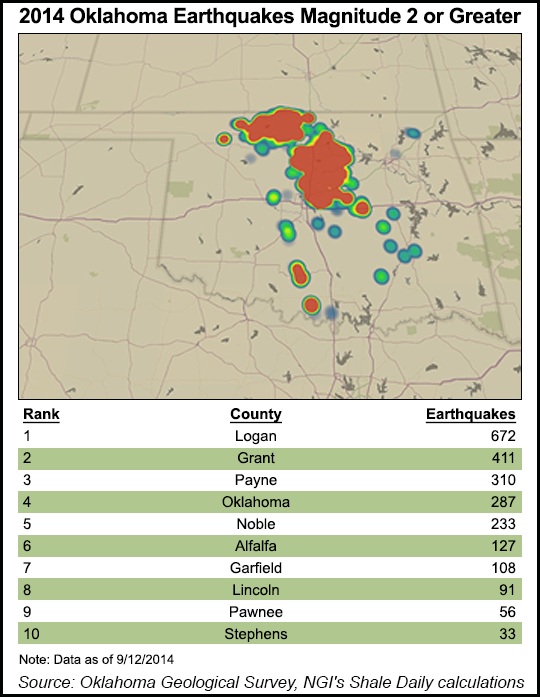Injection Wells Worry Oklahoma Lawmaker
An Oklahoma state representative is mulling the need for new regulations to govern oil and gas drilling waste disposal wells due to fears of groundwater contamination.

While some portions of the Sooner State have experienced temblors that have been blamed on waste injection wells, state Rep. Steve Vaughan (R-Ponca City) told NGI’s Shale Daily he’s more concerned about the potential for groundwater contamination. Since oil and gas activity in the state — including hydraulic fracturing — has ramped up substantially, legacy and new injection wells are being called upon to accept more waste injected at higher pressures, he said.
“In the area where I live, there was a lot of drilling for oil back 60, 70, 80 years ago, a huge amount of it; it was called the three sands area, Vaughan said “Not all over the whole state is it exactly the same as we are here. If you take a block of Swiss cheese, on top it might be flat, but when you cut down through it there are holes everywhere. That is a really good example of what kind of area we have here compared to maybe across the country, across the state.”
Back in the day, there was a lot less drilling waste to dispose of, so gravity played more of a role of settling the waste in the ground than did injection. Now with high volumes of waste being injected at higher pressures, Vaughan said he’s worried about the integrity of the injection wells, particularly the wells that have not undergone testing, which is the case for many of them.
“I’m not pointing a finger toward fracking,” Vaughan said. “I’m just saying there’s a lot more development going on than there ever was before because of fracking. Now there is more disposal substance to get rid of. So they go to those old wells and they push it down with pressure now.”
Vaughan said 90% of his concerns related to injection wells are related to water safety. Earthquakes in his area are relatively uncommon, he said. However, constituents in his district have experienced problems with water. Some wells have been contaminated; some have gone dry, he said. Vaughan said he knew of an apple orchard where the trees died after irrigation.
“I can’t point my finger toward any one well,” he said, “and I’m not wanting to point fingers. I’m just saying guys this is a concern.”
Vaughan said he has not decided whether he will try to introduce legislation related to injection wells. He told NGI’s Shale Daily he thinks that his concerns could be addressed by the Oklahoma Corporation Commission without having to resort to legislation.
“We have got to have fresh water to survive. Somehow we have to work together as a state to make this happen,” he said.
Meanwhile, Oklahoma is working to address the state’s increase in seismic activity, for which some blame the injection wells. The state has created the Coordinating Council on Seismic Activity to link researchers with policymakers and energy industry experts in an effort to understand seismic activity in the state that is thought to be linked to oil and gas drilling activities (see Shale Daily, Sept. 8; July 7).
© 2024 Natural Gas Intelligence. All rights reserved.
ISSN © 2577-9877 | ISSN © 2158-8023 |
